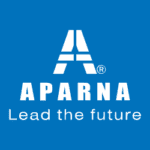Tag: ready mix concrete
Inside Aparna RMC and How Quality Control Ensures Perfection
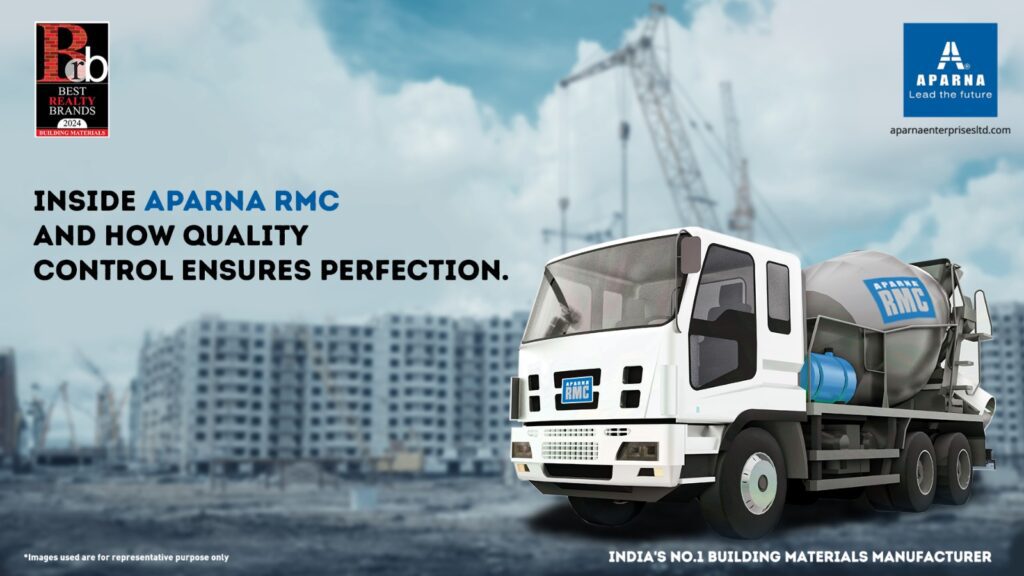
In today’s construction where quality, on-time completion, and reliability are of utmost importance, ready-mix concrete has become an important construction material. However, the strength and consistency of ready-mix concrete are dependent on the quality control processes employed at each step of the RMC manufacturing process.
Traditionally, concrete was prepared by mixing water and cement at the site. So, RMC is superior in quality when compared to the ones manufactured following manual mixing methods. Read the blog to learn the different quality control and testing processes we follow at Aparna RMC, one of the leading ready-mix suppliers.
Challenges in RMC manufacturing
Ready-mix concrete helps ensure the timely delivery of concrete for construction processes. However, sufficient quality controls are essential to ensure that the final product meets the desired standards.
Here are the common challenges in RMC manufacturing:
- Maintaining consistency and managing variations in raw-materials
- Inaccurate mix proportions across batches
- Inconsistency in water-cement ratio
- Equipment malfunctioning and breakdowns
- Improper storage of raw materials
- Human error in batching, equipment usage, etc.
- Lack of temperature control
- Inadequate testing and lack of regular inspections
How does Aparna RMC test ready-mix concrete?
Aparna RMC has become an RMC plant manufacturer in India, majorly due to its commitment to quality. We have listed the different methods we follow to test the quality of RMC. They are generally brought under three phases
1. Raw material/ Ingredient testing
The quality of raw materials used in the manufacturing process determines the quality of the RMC. When they are sourced from external suppliers, the ingredients are tested following industry standards before reaching the manufacturing plants.
At Aparna RMC, all the raw materials including cement, water, aggregates, and admixtures are tested for their quality before being fed into the process. For instance, the water purity is checked to prevent contamination. Dedicated stockpiling is followed to determine aggregates by grade and cement is stored in silos to prevent moisture from seeping in.
2. Right batching and mixing
Aparna RMC uses advanced batching and mixing processes to ensure accuracy and consistency across the process. Automated batching plants help weigh ingredients based on the need and this avoids errors that may incur from manual operations.
Advanced design software helps plant operators tune the mix proportions based on specific requirements and target strength. For instance, some projects may demand a target strength of M20 concrete while others may demand M15 or M40 grade concrete. So, based on the target strength, the software adjusts the mix ratio for concrete grades.
3. Real-time production control
Our technicians and operators track all the important aspects including batch size, water-cement mix ratio for concrete grades, mixing time, etc. Ensuring that they align with the industry standards helps confirm that the ready-mix concrete output meets the desired quality standards.
Post-manufacturing, the experienced team of technicians assesses the consistency and uniformity of the overall batch. This helps identify and correct issues relating to mixing and consistency.
4. Lab tests for product quality
We employ different tests to ensure product quality. For instance, a slump test is used to determine the flowability and workability of the ready-mix concrete. Based on the grades required, the flowability is assessed. The slump test checks if the concrete is easy to pour while also preventing segregation or honeycombing issues.
5. Density and temperature check
Temperature impacts the concrete setting time and they must be closely monitored. They are adjusted based on the specific project requirements. For instance, in hot weather, we use iced water or cool aggregates. Similarly, density is also checked for, after the RMC is manufactured.
Aparna RMC: Leading RMC plant manufacturer in India
When it comes to choosing manufacturers of concrete, you must pay attention to the quality controls followed during the manufacturing process. Aparna RMC is the leading ready-mix concrete company, known for delivering high-quality RMC. It follows stringent quality controls at each step of the RMC production process.
Aparna RMC is certified by ISO 9001:2015 and it adheres to the Bureau of Indian Standards (BIS). It reflects our commitment to quality and excellence in ready-mix concrete manufacturing. It has plants located across South India including Hyderabad, Bangalore, Mangalore, Mumbai, and Vishakhapatnam.
The raw materials and ingredients are tested for their quality, and the batching process is automated based on the mix ratio for concrete grades to avoid errors from manual methods. The ready-mix concrete is lab-tested after production and the density and temperature are adjusted to meet the required standards. The best thing about Aparna RMC is that it can be customised to meet customer requirements when it comes to different things.
FAQs
- What are the quality controls implemented by Aparna RMC?
Aparna RMC follows stringent quality controls at each step of the manufacturing process. Here are the key controls- raw materials/ ingredients testing, right batching, lab tests, slump tests, density and temperature checks, real-time production controls, and so on.
- Is Aparna RMC ISO-certified?
Yes, Aparna RMC is certified by ISO 9001:2015, ISO 45001:2018, and ISO 14001:2015, and it also adheres to the BIS (Bureau of Indian Standards). All these reflect our commitment to industry standards, making Aparna RMC, a leading manufacturer of concrete.
Faster Construction with the Superior Strength of Aparna RMC
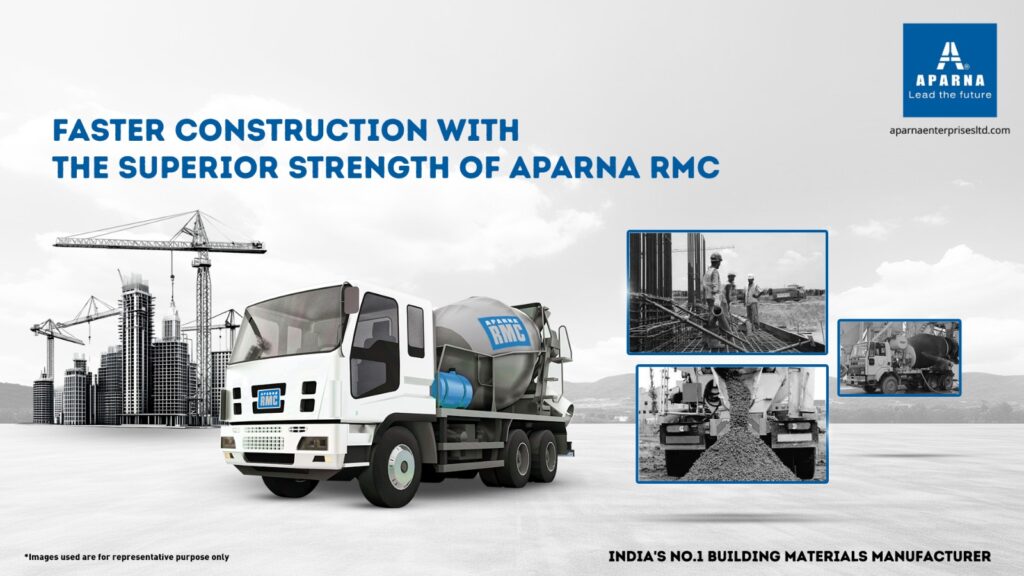
Aparna RMC is a leading manufacturer and supplier of high-strength ready-mix concrete nationwide. With manufacturing plants located across the country in Telangana, Karnataka, Andhra Pradesh, and Maharashtra, Aparna RMC is known for supplying high-quality RMC that can be customised based on the specific needs of the construction project.
Let us explore how Aparna RMC supplies high-strength RMC while enhancing the speed and efficiency of the project.
How does Aparna RMC accelerate construction?
Here’s how Aparna RMC, a leading ready-mix concrete supplier, accelerates construction projects and helps achieve greater efficiencies.
1. Improves construction speed
Ready-mix concrete is a pre-mixed concrete solution that is manufactured in factories under a controlled environment based on the required concrete ratios and grades. After processing, they are transported to the construction site. This is unlike the traditional methods, where concrete is prepared by mixing cement and water at the site.
So, the ready-mix concrete minimises the time required for setup as there is no need to collect materials and mix them at the site. As the concrete can be poured quickly and set in the spot, it improves construction speed.
2. Minimises delays
As the ready-mix concrete is delivered to the site directly, there is a reduced chance of the work getting delayed due to bad weather. Also, as the mixing is automated in an advanced manufacturing facility, the concrete is prepared in consistent quality. So, ready-mix concrete helps minimise delays due to inconsistent mixing or lack of product quality.
3. Handle large volumes
Large-scale construction projects demand significant quantities of concrete. Mixing and preparing the concrete at the site may slow down the construction process. As ready-mix concrete can be manufactured in large batches and with consistent quality, they can be continuously poured without delays. This minimises the time required to complete different stages in construction while speeding up the project.
Other benefits of using ready-mix concrete
While the ready-mix concrete helps minimise construction time, here are the other benefits.
1. Reduces labor costs
The usage of ready-mix concrete reduces the need for manual labor in concrete preparation while allowing for efficient usage of labor in other processes that cannot be automated. They get ample time and energy to focus on the application and finishing stages rather than mixing. This helps minimise labor costs and boost the overall efficiency of the construction project.
2. Consistent output
As Aparna RMC is prepared in advanced manufacturing facilities, the materials are mixed in consistent quantities across batches. This ensures that the output meets desired standards when it comes to strength, performance, and quality. The greater degree of consistency also improves the structural integrity of the building while minimising cracks and failures.
3. Minimises material wastage
As the ready-mix concrete is prepared under controlled conditions, it is prepared in exact quantities depending on the project requirements. It is manufactured by mixing exact quantities of cement, water, and other aggregates while driving an optimal usage of resources.
It minimises raw material wastage and helps reduce adverse environmental impact. It also leads to cost savings from overusage and wastage of raw materials and inputs needed for RMC manufacturing.
4. Increased durability
Ready-mix concrete has greater strength and durability. The building structures constructed with Aparna RMC require less maintenance and repairs. This reduces the need for renovation while improving the lifespan and integrity of the building structure.
5. Cost-effective
As the exact amount of ready-mix concrete can be delivered to the construction site, this reduces material wastage and cost overruns. The usage of RMC also reduces the chances of defects, breakage, and thus minimising the cost of overall maintenance. Also, with RMC, the total cost becomes predictable. This helps builders, contractors, and building owners plan their budgets more appropriately while reducing the possibility of overrun.
6. Highly customisable
Based on the specific needs of the construction project, the concrete ratios and grades can be customised. Other parameters like the strength of the concrete, aggregate size, and water content can be adjusted to match the demands of a specific construction project. This helps ensure that the right type of concrete mixtures are used for construction projects.
Aparna RMC: Leading Ready-mix concrete suppliers in India
Overall, Aparna RMC offers a wide range of benefits in terms of speed, cost-effectiveness, and overall efficiency of construction projects. As the mixing is performed in an advanced manufacturing facility under controlled conditions, the quality is maintained across batches. It reduces the time and labor needed when compared to the traditional process of mixing the concrete at the construction site.
Whether it is a small, medium, or large-scale construction project, using ready-mix concrete helps accelerate construction, minimise construction costs, and drive greater efficiencies. Aparna RMC is one of the leading ready-mix concrete suppliers in Bangalore, Hyderabad, and other parts of India. It is known for supplying superior-quality, premium-grade concrete at economical rates.
For more information, contact us at _+91 9154088440_or info@aparnarmc.com.
FAQs
- What are the different types of concrete mixtures available at Aparna RMC?
The following are the different types of concrete mixtures from Aparna RMC:
- High-grade ready-mix concrete
- Self-compacting ready-mix concrete
- Smart dynamic ready-mix concrete
- Green ready-mix concrete
- Stamp ready-mix concrete
- Lightweight ready-mix concrete
- Glass fiber reinforced concrete
- Bag ready-mix concrete
- What are the benefits of using Aparna RMC?
Aparna RMC offers wide-ranging benefits including:
- Improved construction speed
- Minimises delays
- Reduces labor costs
- Highly customisable
- Minimises material wastage
5 Key Advantages of Using Aparna RMC for Your Next Project
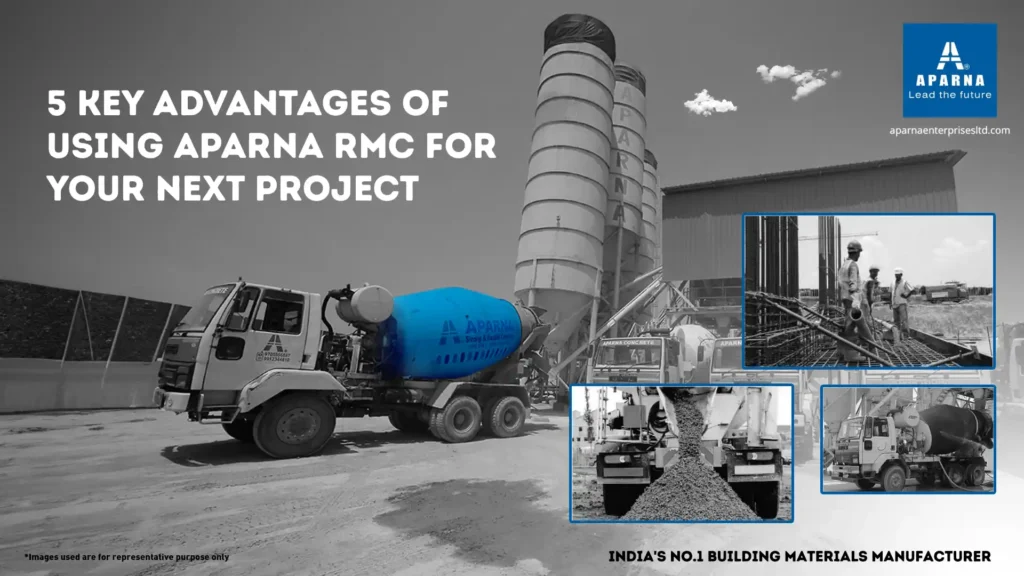
In the construction industry, there is always a demand for high-quality, cost-effective building materials. Ready mix concrete is one such material and has revolutionised the construction industry. It has become a go-to material for constructing roads, skyscrapers, highways, and so on. As it offers a blend of cement, water, and other aggregates, it eliminates the challenges with on-site mixing.
Aparna RMC is one of the leading Ready mix concrete suppliers in India. It has an advanced manufacturing facility and has evolved to be a leading supplier for industrial, residential, and commercial projects. It has 29 RMC plants and can supply 1.8 million Cu.mt. per year.
Wondering why Aparna RMC stands as the best? Read on. In this blog, we have covered the advantages of ready-mix concrete in detail.
What are the advantages of ready-mix concrete in construction?
Here are the key benefits of using Aparna RMC for your projects.
1. Minimises construction cost
Concrete plays a crucial role in determining the construction cost. In large-scale infrastructure projects, concrete accounts for nearly 30-50% of the total costs. Traditionally, concrete mixing happens on the site, involves several steps, and demands manual effort. This leads to inconsistencies and uncertainties. On the other hand, ready-mix concrete is manufactured in a controlled environment using advanced technologies, reducing labour costs.
2. Superior quality
When it comes to large-scale construction projects like bridges, roads, and skyscrapers, quality and consistency are crucial. Unlike the traditional methods of mixing and preparing the concrete on the site, our ready-mix concrete is manufactured in batches following stringent quality standards.
At Aparna RMC, we prioritise quality at each and every stage of the RMC production process. This helps minimise manual error and ensure flawless consistency in the RMC output. We ensure that each batch meets the desired concrete mix ratios and grades, quality and consistency requirements of each construction project. As the mixtures remain the same across, this ensures dependable performance in every project.
Also, Aparna RMC is an ISO9001:2015, 45001:2018 & 14001:2015 certified company and this stands as a testimony to our quality standards. We perform trial mixes after every batch to ensure consistency with the desired quality standards.
3. Reduces construction time
As explained earlier, traditionally, the concrete is produced on the site by mixing cement, water, and other aggregates in fixed proportions. Doing this on the construction site remains a time-consuming process.
As the concrete arrives ready to be poured at the site, the ready-mix concrete from Aparna RMC can be used for immediate application at the site and doesn’t require any processing. This speeds up the construction process while ensuring on-time delivery of construction projects.
4. Reduces material wastage
The traditional process of on-site mixing involves manual estimation of the materials needed. Sometimes, they may lead to spillovers, and this is a costly affair in large-scale infrastructure projects. The ready-mix concrete is prepared using advanced technologies supported by computer-aided designs. So, there is no spillover with RMC and this minimises the wastage on the site.
As ready-mix concrete minimises wastage and promotes a wise usage of materials and resources, it drives an environment-friendly construction.
5. Cost Effectiveness and Time-Saving
As the ready-mix concrete is prepared following advanced technology and stringent quality standards, it showcases durability. It can withstand adverse weather conditions and exposure to chemicals which in turn makes Aparna RMC, an ideal solution for indoors and outdoors.
Ready-Mix Concrete (RMC) enhances construction efficiency by saving time, reducing labour costs, and ensuring superior quality through precise batching. It minimises material waste, cuts down equipment and transportation costs, and promotes a cleaner, space-effective worksite. RMC suppliers handle production, reducing on-site mixing hassles and improving sustainability. Overall, RMC is a cost-effective, high-quality, and environmentally friendly solution for modern construction projects.
Wrapping Up
Aparna RMC is a leading ready mix concrete manufacturer in India. It has 31 RMC plants located in Telangana, Andhra Pradesh, and Karnataka, and produces more than 1.8 cubic meters of RMC every year. So, if you are exploring ready mix concrete in Hyderabad or Bangalore, Aparna RMC is your go-to.
The main advantage of ready-mix concrete for your building is that it minimises construction time, cost, and material wastage. It is also durable and improves labour efficiency when compared to the traditional means of batching, mixing, and testing the concrete at the construction site.
Since Aparna RMC is made to order, the quality, grades, and quantity of RMC can be customised to meet the specific preferences of a building or a construction project. Our manufacturing facility is equipped with advanced technological abilities and innovative expertise to produce superior quality RMC that meets the desired concrete mix ratios and grades, mechanical strength, and global quality standards.
Looking for a leading ready mix concrete manufacturer? Schedule a consultation with our expert and get it done by a leader.
FAQs
1. What are benefits of using Aparna RMC?
Here are the top advantages of using Aparna RMC:
- Minimises labor requirements
- Minimises construction cost and time
- Promotes superior quality and consistency
- Reduces material wastage and emissions
- Long-lasting and durable
- Enhances the safety of the personnel involved.
2. What is the cost of ready mix concrete?
Aparna RMC is one of the cost-effective ready-mix concrete solutions in the market. However, the exact cost of the ready-mix concrete depends on various parameters like the desired mix ratio, aggregates used, nature of the building, etc.
Noise-Free Living with Aparna Venster’s Soundproof uPVC Windows
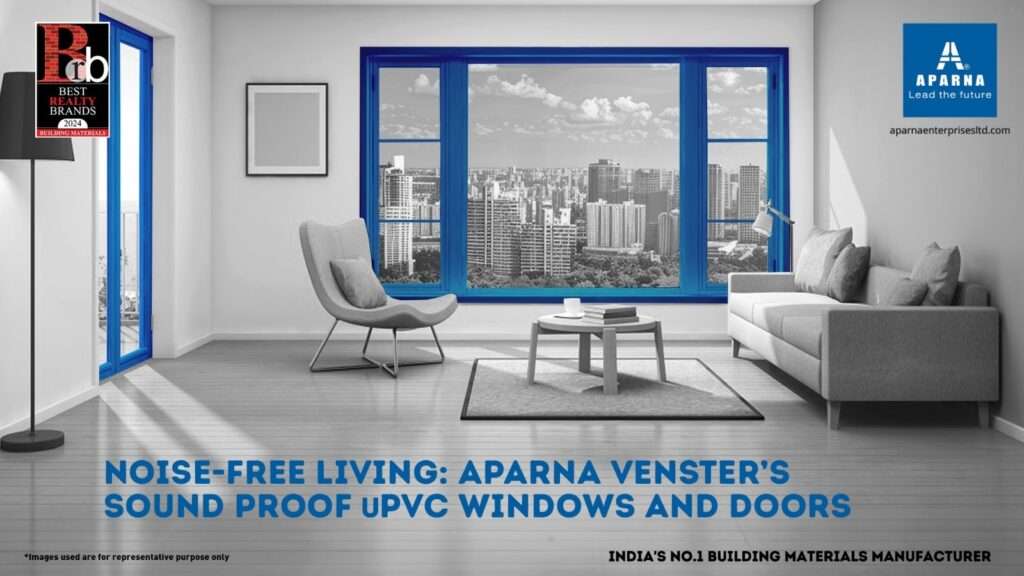
In a world where distractions are plentiful and there’s constant noise to deal with, finding peace in your home has become a mandatory factor. Whether it be traffic, construction noise, or general city sounds, these disturbances have a predominant effect on the overall well-being and productivity. Aparna Venster’s soundproof uPVC windows and doors provide the perfect solution for establishing a serene living space, making sure you can enjoy tranquility in the comfort of your home.
Manufactured with advanced technology, Aparna Venster’s uPVC doors and windows block out noise while adding a touch of elegance to your interiors. From villa windows to uPVC sliding doors, our diverse product range offers a variety of styles to suit every home. For homeowners looking for a peaceful environment and the best in noise-resistant solutions, Aparna Venster is the leader when it comes to uPVC windows manufacturers.
Why Choose Soundproof uPVC Windows for Your Home?
Soundproof windows and doors are not just a luxury- they are a necessity for those looking to create a harmonious home environment. Here’s why soundproof uPVC windows from Aparna Venster are the ultimate choice:
1. Exceptional Noise Reduction
Designed with multi-chambered profiles and double or triple-glazed glass that absorbs and most importantly reduces noise levels. Aparna Venster’s uPVC windows and doors create an effective barrier against outside disturbances, allowing you to enjoy peace even in the most chaotic environments,
2. Energy Efficiency
Not only do soundproof uPVC windows block noise, but they also offer excellent insulation, making your home energy efficient. With double glazing windows, you can minimize heat transfer, keep your home comfortable throughout the year, and reduce energy bills.
3. Durability and Low Maintenance
Aparna Venster’s uPVC doors and windows are built to withstand harsh weather conditions, corrosion, wear and tear. Unlike traditional materials, uPVC requires minimal maintenance, making it a long-lasting and hassle-free solution.
4. Stylish and Versatile Designs
From sleek uPVC sliding doors to classic uPVC casement doors, Aparna Venster offers designs that enhance the aesthetics of any home. Their products seamlessly blend functionality and style, giving your home a modern and elegant touch.
5. Eco-Friendly
Aparna Venster is committed to sustainability. Their products are made from recyclable materials and are manufactured using processes that minimize environmental impact.
Aparna Venster’s Range of uPVC Products
uPVC Sliding Doors
Space-saving and stylish, uPVC sliding doors are ideal for modern homes. They provide easy access to balconies, patios, or gardens while ensuring a noise-free interior. With smooth operation and sleek designs, these doors are perfect for homeowners looking to combine functionality with aesthetics.
Double Glazing Windows
For maximum soundproofing and insulation, double glazing windows are an excellent choice. These windows consist of two panes of glass with a layer of air or gas in between, reducing noise and enhancing thermal efficiency.
uPVC Casement Doors
For those who prefer a classic look, uPVC casement doors are a timeless option. These doors provide a tight seal, making them highly effective in blocking noise and maintaining energy efficiency.
Folding Sliding Doors
Create a seamless connection between indoor and outdoor spaces with folding sliding doors. These doors are not only visually stunning but also offer excellent noise reduction, making them perfect for larger openings.
Customized uPVC Windows and Doors
Aparna Venster understands that every home is unique. They offer customized solutions tailored to your specific needs, ensuring the perfect balance of design, functionality, and affordability. With competitive uPVC windows price options, they make premium quality accessible to all.
Benefits of Aparna Venster’s Soundproof Solutions
-
Noise-Free Living
Enjoy a quieter and more serene environment by blocking out external noise.
-
Energy Efficiency
Keep your home comfortable while saving on energy bills with superior insulation.
-
Aesthetic Appeal
Upgrade your interiors with sleek and modern designs, including the best sliding doors and windows.
-
Durability
Resistant to harsh weather and wear, these products are built to last.
-
Eco-Friendly
Reduce your carbon footprint with sustainable and recyclable materials.
How Aparna Venster Stands Out Among uPVC Windows Manufacturers
Aparna Venster has established itself as a leader in the industry by prioritizing quality, innovation, and customer satisfaction. Here’s what sets them apart:
1. Advanced Technology
Aparna Venster integrates cutting-edge technology into their designs, ensuring superior soundproofing and energy efficiency.
2. Wide Range of Designs
From uPVC sliding doors to folding sliding doors, Aparna Venster offers a variety of styles to suit different architectural needs.
3. Customization Options
With their flexible uPVC windows price options, they cater to a wide range of budgets without compromising on quality.
4. Sustainable Practices
Aparna Venster uses eco-friendly materials and manufacturing processes, aligning with global sustainability goals.
Choosing the Right Solution for Your Home
When selecting soundproof windows and doors, consider the following factors:
-
Noise Levels:
Choose double glazing windows or uPVC casement doors for maximum sound insulation.
-
Design Preferences:
Whether you prefer sleek uPVC sliding doors or classic designs, Aparna Venster has something for everyone.
-
Budget:
With competitive uPVC windows price options, you can find a solution that fits your budget.
-
Space:
For compact areas, folding sliding doors and uPVC sliding doors are ideal choices.
Experience Peace with Aparna Venster
In a world full of noise and distractions, creating a calm and peaceful home is more important than ever. Aparna Venster’s soundproof uPVC windows and doors are the ultimate solution for achieving noise-free living. With options like uPVC sliding doors, folding sliding doors, and double glazing windows, they provide a perfect blend of functionality, style, and durability.
Transform your home into a sanctuary of serenity and style with Aparna Venster. Experience the difference today!
Exploring Aparna RMC’s Range of Quality Concrete
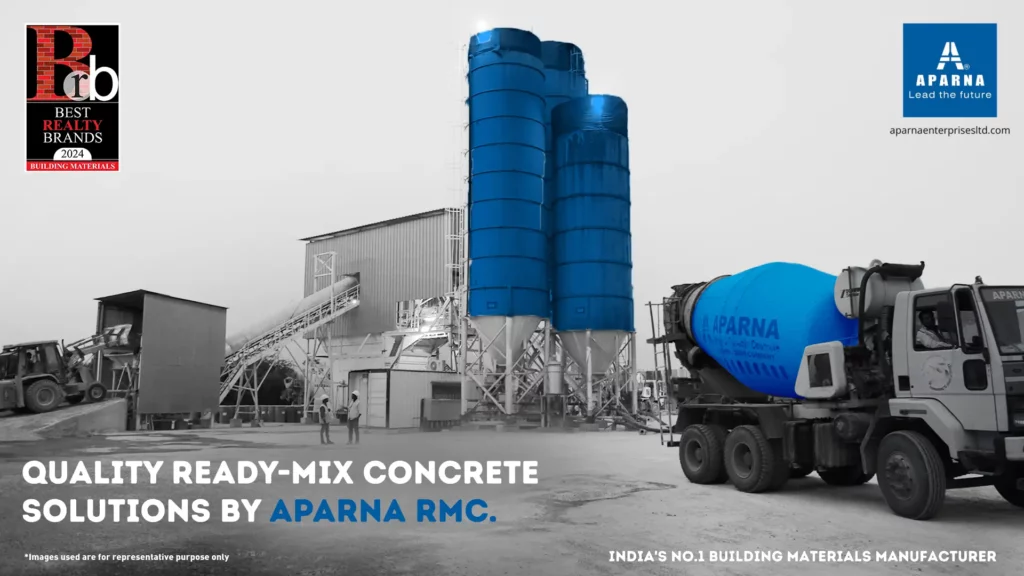
Aparna RMC is a pioneer in ready-mix concrete solutions. With state-of-the-art manufacturing technology, Aparna RMC is a leading RMC plant manufacturer in India. We have strategically located plants across different states including Telangana, Karnataka, Andhra Pradesh, Maharashtra, and so on.
Aparna RMC has 29 plants in total and has evolved to be a prominent ready-mix concrete supplier for residential, commercial, infrastructure, industrial, and institutional projects with the capacity to produce and supply 1.8 million Cu.mt. per year.
Emerging trends in concrete manufacturing
Following are some of the key trends in ready-mix concrete solutions.
1. High-performance admixtures
High-performance admixtures are gaining prominence in ready-mix concrete. RMC suppliers like Aparna RMC are committed in developing innovative concrete solutions including high-grade concrete, self-compacting concrete, and other fibre-reinforced concrete etc.
Aparna RMC specializes in the manufacture of high-performance concrete solutions. We manufacture concrete solutions that are durable, strong, and last longer. Through innovative practices, we aim to deliver concrete that is economical and offers faster placement.
2. Smart manufacturing system & solutions
Integrating digital solutions and powered by CRM integrated with ERP and SCADA-based production automation and a fleet of Vehicle Tracking System (VTS). This helps enhance the efficiency of the RMC manufacturing process. It also helps achieve consistency in the output quality.
As a leading ready-mix concrete supplier in the country, we are at the forefront of updating technology. Our RMC plants are equipped with the latest technology to ensure proper mixing, the right water-to-cement ratio, and a high-quality aggregate.
3. Sustainable process
Aparna RMC stands committed to ensuring sustainability in the manufacturing process. All the 29 RMC plants are computerised by CRM integrated with ERP and SCADA-based production automation and a fleet of Vehicle Tracking System (VTS).
As manufacturing happens in a controlled environment and the entire process is automated, the process helps minimise waste and resource utilisation.
Why choose Aparna RMC for ready-mix concrete solutions?
Aparna RMC has emerged as one of the prominent RMC suppliers. The following are some of the reasons why you must choose Aparna RMC for your building.
1. High quality
We stand committed to delivering the highest quality when it comes to ready-mix concrete. We are also recognized with ISO 9001:2015, 45001:2018 & 14001:2015, QCI certifications for providing quality products and timely service to customers.
Our manufacturing units are equipped with central laboratories for testing the concrete produced in different units.
2. Highly customizable
The ready-mix concrete manufactured can be customised to meet customer requirements. While working at the crossroads of innovation, research, functionality, and design, our RMC solutions are updated to meet the evolving market dynamics. Based on the durability and strength requirements of a specific project, the mix can be customised.
3. Eco-friendly solutions
Aparna RMC is committed to sustainability and manufacturing eco-friendly building materials. We manufacture AstraGlowCrete, a ready-mix concrete produced from cement and fly ash which has lower heat of hydration and reduces carbon emissions from concrete surface.
4. Diverse expertise
We have been in the field for over 18 years with rich experience and expertise in technology and manufacturing domains. With building materials having constantly evolved over the years, We continue to be the market leader showcasing our ability to meet consumer demands and dynamic trends in the field.
Conclusion
As the leading RMC supplier, Aparna RMC is a forerunner in the field. We manufacture a wide range of concrete solutions including high-grade concrete, dynamic concrete, self-compacting concrete, fibre-reinforced concrete, etc.
Our Ready-mix concrete solutions manufactured at our state-of-the-art facilities, increase the durability, strength, and integrity of the structures. Our RMC solutions can be customised to a greater degree based on the specific needs of a building.
FAQs
1.Where is the Aparna RMC plant located?
Aparna RMC has a notable presence in different regions, notably including Hyderabad, Bangalore, Mangalore, Mumbai, and Vishakapattinam. It has 18 plants in Hyderabad, 5 in Bangalore, and 3 in Mumbai.
2.What are the benefits of using ready-mix concrete manufactured by Aparna RMC?
The ready-mix concrete manufactured at Aparna RMC stands ahead in the following aspects.
1.High quality
2.Durable, consistent, and strong
3.Eco-friendly materials
4.Superior solutions for all building needs from residential to commercial and industrial.
5.Innovative and technological superiority
3.How much does ready-mix concrete cost?
The cost of ready-mix concrete solutions depends on several attributes, including the mix ratio, degree of customization, additives involved, type of building, etc.
Building Greener Futures With Aparna Enterprises Limited
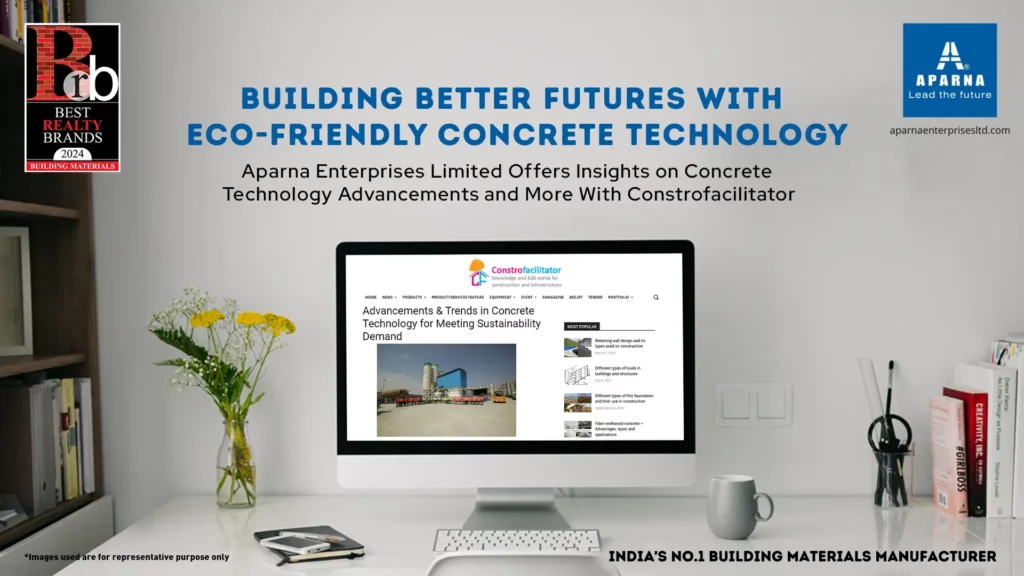
The increasing demand for concrete innovation is driven by the urgent need for sustainable solutions in construction. With urbanization and infrastructure development on the rise, there’s a pressing demand for concrete that not only meets structural requirements but also minimizes environmental impact. Innovations in concrete technology are focused on sustainability, incorporating recycled materials, reducing carbon emissions, and optimizing production processes. Meeting this demand requires a concerted effort from manufacturers to invest in research and development, prioritize sustainability, and embrace cutting-edge technologies to deliver innovative, high-quality concrete products for the future. Aparna Enterprises Ltd [AEL] is one such company manufacturing a wide spectrum of building-material products, such as RMC (ready-mix concrete), uPVC windows and doors, Floor and Wall tiles, Aluminium window and door systems and Exterior Facades, Cold Roll form products etc. Most of these products are available in pan India and international markets through an extensive dealer network which constitutes more than 350 vendor partners for different brands.
Constrofacilitator recently had an exclusive interview with Mr. Gopal Krishna is the Business Head for Aparna RMC. He is overlooking the ready-mix concrete division of the company and its business development. He is a visionary business leader with over 21 years of experience in crafting and executing strategic initiatives to drive top and bottom-line growth. His work in the construction segment, with a focus on cement and RMC, has focused on transforming businesses sustainable and profitable. He has achieved 100% growth in new business setups, revitalised underperforming regions, and implemented successful ERP/SAP projects. He has a remarkable track-record of successful rollout, management, and completion of projects by navigating complex challenges and making high-stake decisions.
During the interview, he shared insights on upcoming trends, innovations in the concrete construction industry, technological advancement, quality control measures and much more.
Here are the excerpts from the interview.
1.What do you foresee as the upcoming trends or innovations in the concrete construction industry, especially in terms of materials, technologies, or construction methods?
The dynamics of concrete construction is expected to undergo a dramatic transition as we enter a new era within the construction industry. With technological advancements, better materials, and modern construction methods, we are looking at revolutionising the realm of building materials.
The future of concrete construction will be on the back of building a sustainable and greener future. Traditional concrete has very adverse effects on the environment with CO2 emissions from concrete production accounting for about 8 percent of global emissions. However, the advent of ‘Green Concrete’ can reduce the impact on the environment compared to conventional concrete. The goal of green concrete is to utilise recyclable materials for production, produce less carbon dioxide, and consume low energy for production, resulting in durable and economical concrete vis-à-vis its conventional counterparts.
Furthermore, the concrete construction industry is undergoing a pivotal shift towards the production of innovative materials such as Smart Dynamic Concrete (SDC), a revolutionary development aimed at significantly diminishing carbon footprints in the construction process. The use of SDC reduces the carbon footprint of concrete and the construction process through the lower cement content, less energy, and lower in-place vibration requirements. SDC offers several economical and technical benefits, including faster speed of concrete placement with less labour, higher durability, lower energy consumption, as well as higher economy, ecological and ergonomic performance.
Drones are increasingly used in concrete technology and construction, with applications such as site inspections, progress monitoring, and data collection. Moreover, 3D printing is being used to make sophisticated concrete structures with a shorter turnaround time. This technology is aimed to transform how concrete is poured and cast, leading to faster, cheaper, and more precise construction method.
These trends and innovations have the potential to transform the concrete construction industry by improving efficiency, reducing costs, and enhancing project outcomes.
2.What initiatives or technologies are being explored to make cement production more environmentally sustainable?
Several initiatives and technologies are currently under exploration to enhance the environmental sustainability of cement production to mitigate the adverse effects of traditional concrete manufacturing on the environment.
The exploration of Carbon Capture technology leads the march. Innovative approaches, such as carbon capture and storage (CCS) technology, help capture CO2 emissions during cement production. CCS results in reduced greenhouse emissions associated with the cement production process by repurposing CO2 for use as concrete additive. Moreover, green concrete and smart dynamic cement are increasingly finding prominence in this bid.
3.How do you ensure the quality control of concrete throughout the production process, from raw materials to the final product?
Aparna RMC undertakes various measures to maintain quality control of concrete from production through delivery. We have 27 plants which are computerised using MCI 360 and Siemens PLCs, which guarantee accurate batching, and continuous production. Aparna RMC employs this technology that helps make custom mixes of aggregates, cement and admixtures that ensures that we remain a reliable partner in the construction industry. Additionally, we have measures to check that the concrete is of high standard so that it meets the industry standards hence, ensuring that RMC supplied at the site continues to be of high grade.
4.What recent innovations in cement technology have influenced the performance and environmental impact of concrete?
Recent innovations in cement technology have influenced the performance and environmental impact of concrete in various ways. A recent study has found that substituting 90% of the coal with Refused Derived Fuels (RDFs) results in saving around 28.6 metric tons per hour of coal, and increasing the Sewage Sludge (SS) fraction in the total heat consumption by 6% leads to a 17 kg of CO2 emission per metric ton of coal. This approach can contribute immensely in curbing the high emission rate associated with cement production. Alternative methods of mitigating the environmental effect of cement production are continuously developed by researchers, engineers, and contractor companies using other cementitious materials like fly ash, slag, and other industrial by-products. Innovative approaches, such as carbon capture and storage technology, help capture CO2 emissions during cement production. This captured CO2 can then be used in concrete production, resulting in a significant reduction in greenhouse gas emissions. Moreover, the use of alternative materials, such as recycled aggregates is being explored to improve concrete performance and reduce the environmental impact.
5.In what ways does your company incorporate sustainable practices in concrete production, such as the use of recycled materials or environmentally friendly additives?
Aparna RMC incorporates sustainable practices in concrete production in several ways. We incorporate recycled aggregates to the environmentally friendly concrete production, along with SCMs. Aparna RMC’s controlled batch process ensures wastage control and resource conservation through supplementary cementitious material such as fly ash, slag, and other industrial wastes. Our water management strategy involves reduced consumption and recycling water so as to limit their impact on the environment.
6.What are the key factors influencing the quality and consistency of ready-mix concrete (RMC) during the production process?
To produce high-quality concrete, it is crucial to adhere to several key principles. First and foremost, proper mixing is essential, ensuring a thorough incorporation of cement, aggregates, water, and admixture to eliminate lumps and achieve a homogenous blend. Uniformity of the water to the cement ratio throughout the project is vital since excess water would compromise the concrete’s strength whereas insufficient amount makes the material difficult to work with, leading to a poor final product. The dimensions, form, and size of the aggregates also impact the concreteness of the mix, with the fine aggregates having to absorb more water for better workability. The use of only the best quality cement and aggregates that conform to specified standards is of paramount importance in achieving the greatest outcomes. In addition to that, it is important to note that the adoption of sustainable approaches such as the use of recycled aggregates and Supplementary Cementitious Materials (SCMs) not only minimises environmental burden on cement production but also improves quality of ready- mix concrete.
Aparna Enterprises Limited Featured In EPC World Magazine
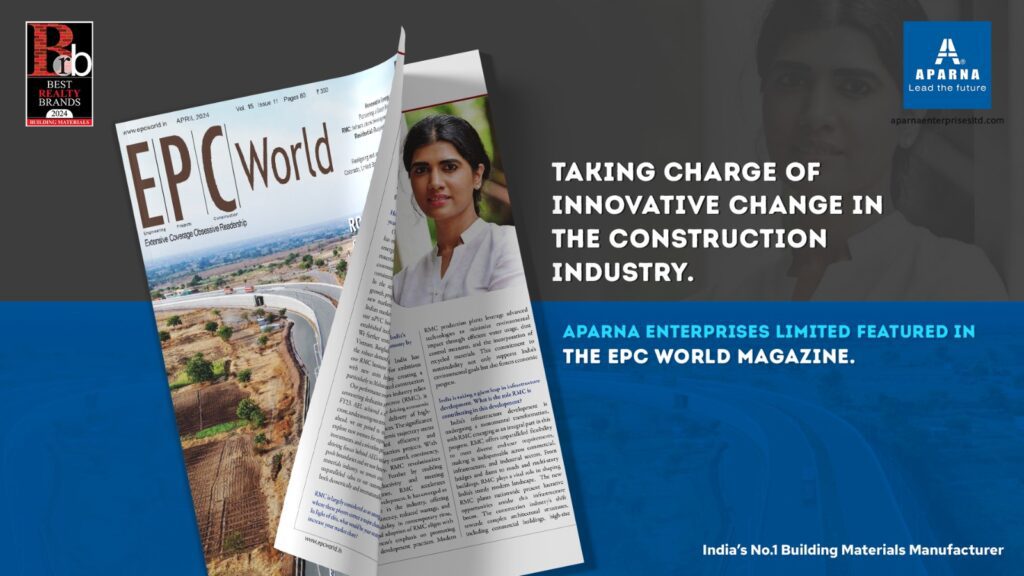
The rise of RMC proves its uprising as not just an industry trend, representing a fundamental shift in India’s construction industry. Steering the industry’s philosophy towards more sustainable, efficient and higher-quality building practices with minimal time taken. Ready Mix Concrete plays a key role in supporting environmental priorities, resulting in less wastage compared to on-site concrete mixing.
In this feature, we take a deep dive to look at the innovations and Aparna Enterprises Limited contribution to the nation, the challenges faced and the strategies being deployed to cement RMC’s place as the bedrock of new India
RMC will be a key contributor in India’s ambitious target of $5 trillion economy by 2025. What is your take on this?
The growing economy of India has generated significant demand for ambitious infrastructure projects, thereby creating a need for robust and sophisticated construction solutions. As the construction industry relies heavily on Ready Mix Concrete (RMC), it emerges as a crucial part for driving economic growth by enabling the delivery of high-quality products and services.
The significance of RMC in India’s economic trajectory stems from its unparalleled efficiency and effectiveness in construction projects. With its emphasis on quality control, consistency, and time efficiency, RMC revolutionizes project execution. Further by enabling heightened productivity and meeting stringent timelines, RMC accelerates infrastructure development. It has emerged as a game-changer in the industry, offering improved consistency, reduced wastage, and enhanced durability.
In contemporary times, the widespread adoption of RMC aligns with the government’s emphasis on promoting sustainable development practices. Modern RMC production plants leverage advanced technologies to minimize environmental impact through efficient water usage, dust-control measures, and the incorporation of recycled materials. This commitment to sustainability not only supports India’s environmental goals but also fosters economic progress.
India is taking a giant leap in infrastructure development. What is the role RMC is contributing in this development?
India’s infrastructure development is undergoing a monumental transformation, with RMC emerging as an integral part in this progress. RMC offers unparalleled flexibility to meet diverse end-user requirements, making it indispensable across commercial, infrastructure, and industrial sectors. From bridges and dams to roads and multi-story buildings, RMC plays a vital role in shaping India’s sturdy modern landscape. The new RMC plants nationwide present lucrative opportunities amidst this infrastructure boom. The construction industry’s shift towards complex architectural structures, including commercial buildings, high-rise driveways, and coastal highways, underscores the soaring demand for high-performance concrete. In order to fulfil these ambitious projects and housing demand, RMC plants have gained significant growth.
Moreover, the expansion of the RMC industry to Tier II and III cities signifies its widespread adoption beyond metro projects. This expansion into smaller urban centers and rural areas highlights the growing demand for RMC products nationwide. RMC’s adaptability, efficiency, and eco-friendliness contribute significantly to India’s infrastructure development, aligning with the country’s ambitious construction goals and broader economic growth objectives.
How has your organization performed in the last three years?
Over the past three years, Aparna Enterprises (AEL) has made remarkable strides in the infrastructure sector, emerging as a leading provider of comprehensive building material solutions. Our commitment to innovation and customer satisfaction has been the reason driving consistent growth across all segments of our operations. In the recent past, AEL has witnessed exponential growth, propelled by strategic expansions and penetrating new markets. Last year, we expanded into the North Indian market, specifically the Delhi NCR region, with our uPVC business brand Okotech, which has swiftly established itself as a prominent player in the industry. We further ventured into South Asian markets such as Vietnam, Bangladesh, Sri Lanka, and Nepal, leveraging the robust demand for Okotech products. Additionally, our RMC business has experienced substantial growth, with new units being established in key regions, particularly in Maharashtra.
Our performance over the past three years reflects our unwavering dedication to excellence and innovation. In FY23, AEL achieved a remarkable revenue of Rs 1,650 crore, underscoring our strong growth trajectory. Looking ahead, we are poised to sustain this momentum and explore new avenues for expansion. Innovation, strategic investments and a relentless pursuit of superiority are the driving forces behind AEL’s success. As we continue to push boundaries and set new benchmarks in the building materials industry, we remain committed to delivering unparalleled value to our customers and stakeholders, both domestically and internationally.
RMC is largely considered as an unorganized market where these players corner a major chunk of revenue. In light of this, what would be your strategy to increase your market share?
In the largely fragmented and unorganized market of RMC, establishing a prominent presence requires a strategic approach focused on quality control, innovation, and collaborative partnerships. We implement a multifaceted strategy which is aimed at delivering superior products and expanding our reach across diverse regions.
The most important focus for us has been prioritizing our product quality and exceptional customer service. We continuously innovate and enhance our product offerings. By introducing new products and improving existing ones, we aim to differentiate ourselves from competitors and attract customers seeking reliable solutions for infrastructure projects. Additionally, collaborating with trusted suppliers enables us to streamline product access and expand our distribution channels, thereby reaching a broader consumer base across various regions.
Furthermore, by acquiring established leaders in the industry or pursuing mergers with compatible entities, we can consolidate resources, broaden our target audience, and enhance overall competitiveness in the market. Amidst the increasing demand for high-quality products in the Indian market, particularly from multinational companies, we remain steadfast in our focus on quality and innovation which enables us to capture larger market share and driving sustained growth.
For the benefit of our readers, please share the challenges RMC manufacturers face while executing realty projects in metros
Execution of real estate projects in metro cities is a formidable challenge for RMC manufacturers. The real estate sector downturn weakened by liquidity constraints impacts demand and revenue streams. In addition, the traffic regulations and congestion on the roads do not allow the delivery of cement, which is very important for maintaining the quality of the product and the timely completion of the project. Another challenge is ensuring a constant supply of raw materials such as aggregates, with logistical limitations and supplier dependencies posing the risk of the disruption of the supply chain.
Additionally, the presence of smaller unorganised scale players in the RMC industry complicates the competitive scenario. Traffic regulations and city-space restrictions pose challenges for establishing commercial plants. These challenges call for the RMC manufacturers to come up with innovative ways such as diversifying the marketing efforts to semi-urban areas and improving the logistic operations. Collaboration with the stakeholders and advocacy for simple regulatory procedures are equally crucial for the smooth operationalisation of realty projects in metro cities.
What are the other challenges faced by RMC manufacturers while commissioning infrastructure projects in India?
Besides the mentioned issues, manufacturers of RMC also face multiple other impediments while deploying infrastructure projects in India. Throughout the whole process, from preparation to transportation and use of RMC, a large number of risks are present and some of them will lead to a lack of consumer confidence and diminished profits unless managed properly. Besides the internal factors, including the incorrect choice of admixture, machine breakdowns, and transportation accidents rank high among the external factors that call for sound management strategies for a streamlined flow of operations and effective completion of the projects.
In addition, factors such as the wrong mix formula, unjustified specifications for quality standards, and the transportation lag time contributed by the road traffic introduce unforeseen inconveniences to infrastructure projects. Furthermore, environmental issues may add up to more complex problems. Adhering to the regulations for the environment and minimising the environmental impact of the production and utilisation of RMC should be prioritised.
Resolving these problems should be done through a solution that consists of risk management techniques, quality control practices, logistical effectiveness, and environmental consciousness so as to achieve the successful outcomes of RMC projects in India.
There is a paucity of skilled manpower in the RMC industry? What are the steps you are taking to increase skill manpower in the RMC sector?
The lack of skilled manpower in the RMC industry is a major problem in its growth and efficiency. Recognising this issue, we have implemented several steps to increase skilled manpower in the RMC sector. We have internal programs where extensive training are provided aimed at giving people the skills and the expertise needed for different positions in the RMC sector.
We equip them with knowledge on concrete technology, quality control, operation of equipment, safety protocols, customer service, etc. Our skill development helps in skill improvement and career development of the workforce .We invest in the training of professionals with the aim of improving the productivity, efficiency, and sustainability of the RMC sector, and in so doing, fuelling its growth and success in the long run.
Your take on the government policies and regulations and the tweaks required to propel the RMC sector
Policies and regulations of the government are integral in determining the evolution and growth of the RMC sector in India. Efforts by the government such as advocating the use of RMC in infrastructure projects and pushing its benefits in smart city missions has greatly helped the industry to grow.
Regarding the RMC sector, more amendments should be made. These include simplifying the regulatory framework in order to promote a friendly business environment for RMC manufacturers, financial and tax incentives to promote the use of RMCs, and improving infrastructure to stimulate construction activities that are the major drivers of demand for RMC.
Furthermore, sustainability, research and technology investment towards increased longevity of RMC, and a continuous supply of high-quality aggregates are critical for the sustainable growth of the product in India. All in all, a coordinated approach among government, industry stakeholders, and regulatory bodies is needed to overcome challenges, implement applicable changes, and take the RMC sector to the next level towards sustainability.
What are your expansion strategies for the fiscal year 2024-25? Are there plans to launch new products or is a Greenfield or Brownfield facility in the offing?
In the fiscal year 2024-25, our expansion strategies are twofold, to strengthen market presence in the North region of India and expand our reach beyond regional confines and actively engage in large and government infrastructure projects. Diversifying our market penetration in North India is a multiple strategic action process.
In line with this, we intend to create a more viable sales and delivery network by placing new sales offices and distribution centers at strategic points across the region. Our reputation will enable us to develop alliances and distribution networks in these regions, ensuring that our products and services cater to the specific needs and preferences of different markets. Along with market expansion attempts, we also aim to be part of government ambitious infrastructure projects.
We will keep on investing in modern production facilities and also upping the efficiency of our current units to remain steadfast and cater the burgeoning demand of the infra sector.
